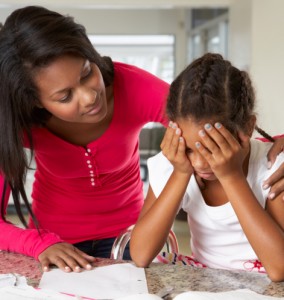 A WebMD study of stress in parents and children suggests many parents may not notice signs of stress in their children. When parents do recognize their children’s stress, they often misattribute the stress to schoolwork challenges, even when the cause of the stress is closer to home.
A WebMD study of stress in parents and children suggests many parents may not notice signs of stress in their children. When parents do recognize their children’s stress, they often misattribute the stress to schoolwork challenges, even when the cause of the stress is closer to home.
Do Parents Recognize Their Children’s Stress?
WebMD’s 2015 Stress in Children Consumer Survey collected data from June 1 to July 31, surveying a total of 432 parents of children aged 5 to 13. The survey showed high levels of stress among parents, who rated their stress on a scale of 1 to 10. Fifty-seven percent reported their stress at a 7 or higher, and almost 1 in 5 parents said their stress was a 10.
Even though these parents reported high levels of stress, most did not think their kids were stressed. In fact, 60% percent of parents ranked their children’s stress at a 4 or lower.
To analyze children’s stress levels, the survey asked about behaviors associated with stress, such as arguing, crying, anxiety, and headaches. Seventy-two percent of parents reported their children had at least one symptom associated with stress during the last 12 months. Forty-four percent of children complained of headaches or stomachaches, and 38% said they experienced frequent nightmares or insomnia. Forty-three percent of parents said their children argued more than usual, and 37% reported an increase in crying or whining. These findings suggest that parents notice symptoms of stress in their children but may not attribute these symptoms to stress.
Why Are Kids So Stressed?
The array of stress-related symptoms reported by most children in the study indicate that kids often struggle with stress, even if their parents do not correctly identify their symptoms.
When asked about the sources of their children’s stress, most parents (53%) said schoolwork and homework were key factors, and 51% said their children’s friends caused stress. Yet 60% of survey respondents reported a stressful family event—such as a divorce, job loss, or death in the family—in the last year. This suggests much of children’s stress may stem from difficulties at home.Bullying may also play a role in children’s stress levels. Thirty-eight percent of parents reported that their children experienced bullying, with 51% of those parents placing their children’s stress levels between 8 and 10.
The American Psychological Association’s Stress in America survey may help illuminate some causes of stress among older youth. During the school year, teens often report higher stress levels than adults, though 54% of teens say stress has little or no impact on their physical health, compared to 39% of adults.
Helping Stressed Youth
Therapy can help kids better manage their stress, and some of those coping with conditions such as anxiety or depression may also obtain benefit from medication or extensive lifestyle changes. Overload can affect a child’s overall well-being, so the American Academy of Pediatrics advises parents to intervene if they observe one or more of the following in their children:
- Frequent physical symptoms, such as stomach pain or headaches
- Fatigue, restlessness, or agitation
- A depressed or low mood, irritability, or negativity
- A loss of interest in previously enjoyed activities
- Difficulty communicating about negative feelings
- Changes in grades
- Behavior problems such as stealing, lying, or neglecting family responsibilities
- Changes in a child’s level of dependency; some stressed kids regress, becoming more dependent on their parents
References:
- American Psychological Association survey shows teen stress rivals that of adults. (2014, February 11). Retrieved from http://www.apa.org/news/press/releases/2014/02/teen-stress.aspx
- Shaw, G. (2015, August 17). WebMD survey: Parents don’t see kids’ stress signs. Retrieved from http://www.webmd.com/children/news/20150817/stress-survey
- Signs of overload. (2015, August 20). Retrieved from https://www.healthychildren.org/English/healthy-living/emotional-wellness/Pages/Signs-of-Overload.aspx

The preceding article was solely written by the author named above. Any views and opinions expressed are not necessarily shared by GoodTherapy.org. Questions or concerns about the preceding article can be directed to the author or posted as a comment below.


 Kids, School, and Worry … Oh, My!
Kids, School, and Worry … Oh, My! When Does Protecting Your Kids Become Over-Parenting?
When Does Protecting Your Kids Become Over-Parenting? Recognizing, Restructuring, and Relieving Holiday Stressors for Kids
Recognizing, Restructuring, and Relieving Holiday Stressors for Kids

Please fill out all required fields to submit your message.
Invalid Email Address.
Please confirm that you are human.
Leave a Comment
By commenting you acknowledge acceptance of GoodTherapy.org's Terms and Conditions of Use.